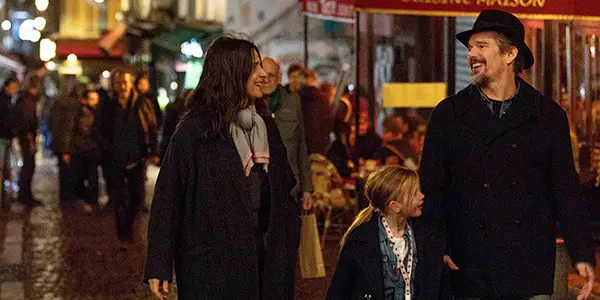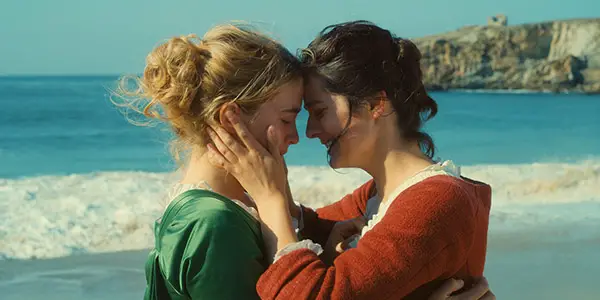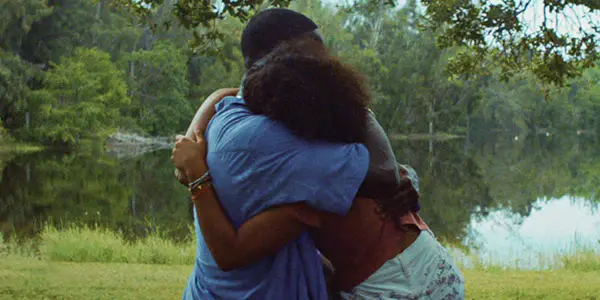Chicago International Film Festival Week 1: THE TRUTH, PORTRAIT OF A LADY ON FIRE And WAVES

Born & raised in the Chicagoland area, I've been watching…
The first week of the 55th Chicago International Film Festival has come to a close, so let’s take time to recap some of the films that screened during this week.
The Truth (Koreeda Hirokazu)

Kore-eda Hirokazu, the mind behind the 2018 Palme d’Or-winning Shoplifters, returns to the screen with The Truth, his first film not in Japanese. It follows Lumir (Juliette Binoche), a screenwriter, who returns to her Parisian childhood home with her husband Hank (Ethan Hawke) and their daughter to celebrate the release of her mother Fabienne’s (Catherine Deneuve) memoir. Upon arrival, Lumir and Fabienne’s relationship is once again put to the test as the former reveals that her mother’s memoir has fabricated stories. Meanwhile, Fabienne encounters setbacks on the set of her latest film, as she faces bad memories with the arrival of a young actress (Manon Clavel).
The Truth blends the brutal familial intensity of films like Trey Edward Shults‘ Krisha with a more intimate, healing notion of forgiveness and acceptance of past mistakes. Kore-eda wants the viewer to know that memory is subjective and our arguments over which perception of a tiny detail is more accurate. As a character states late into the film, “You can’t trust memory.” While it feels like the film ventures into territory that’s a bit too familiar, Kore-eda still manages to retain a fresh feel, which is impressive especially considering he’s directing a film not even in his first language.
The performances are excellent all-around. Deneuve seems to bring a stubborn wit to the table at first, but her portrayal soon turns more melancholy, adding another layer of complexity to the mother-daughter dynamic that carries the film on its back. Binoche is even more emotionally invested, and her facial expressions are just as key to her performance as her line delivery is. Ethan Hawke is Ethan Hawke, but he’s clearly having a fun time here, even when his character is negated to the sidelines. Clémentine Grenier, who plays Lumir and Hank’s daughter Charlotte, delivers a surprisingly resonant performance as well.
All in all, The Truth is a film that aims to bridge a connection between speculation, and, well…the truth. Kore-eda uses familiar images and memories we can relate to our own childhoods, enabling us to feel the emotion and grasp for dominance the two leads tussle over throughout the runtime. In the end, it falls upon a singular sequence to mend the broken bond between them; one that, thankfully, doesn’t feel forced. From this segment to the film’s closing scene, the tone gracefully shifts from a straightforward drama to a calming odyssey of love and remorse. It doesn’t completely stick the landing, but it’s worth viewing, and Kore-eda shows tremendous future potential if he wishes to continue expanding outside of Japanese cinema.
Portrait of a Lady on Fire (Céline Sciamma)

Céline Sciamma‘s masterful Portrait of a Lady on Fire proves to be more than just an expressive period piece. It’s a deeply moving, singular tale of awakening desire that recognizes the beauty of the burning fire that is lit under its two leads over the course of the story. The film follows Marianne (Noémie Merlant), a woman commissioned to paint the wedding portrait of Héloïse (Adèle Haenel). Initially, Marianne masquerades as a simple companion to the reluctant Héloïse, observing her features during their walks and painting her portrait late at night without her knowing. As the two grow more intimate, however, their attraction to each other continuously grows, with stirring, heartbreaking results.
Something I heard going into my screening was that there were similarities to Luca Guadagnino’s 2017 film Call Me By Your Name, and after exiting the theater, I felt conflicted about this statement. In a sense, there are structural similarities (namely the ending, in addition to references to a story that reflects the film’s themes), but despite the resemblances, it’s hard to call Sciamma‘s vision anything short of a triumph on nearly every level. It starts off as enticing and mysterious, but quickly transports the viewer into an even deeper stupor of romance.
The relationship between Héloïse and Marianne is one of the few in recent years that gets the viewer to think as much as it gets them to feel. It captures that careful, delicate blend of style and substance, but even that’s an understatement when describing just how damn gorgeous this film really is. It’s one thing to try and pick apart the tiny details that make up the structure, but it’s another when they come to you, and Portrait of a Lady on Fire definitely falls into the latter category–in a good way. Noises that the viewer hears in the scenery initially seem one-sided, but as Marianne’s and Héloïse’s attraction to each other grows, the viewer realizes that those sounds aren’t one-sided at all. Waves are just waves at first, but what are they crashing into? Rocks. Sand.
The mythical replication of the core text here (the story of Eurydice and Orpheus) has never felt more emotionally satisfying. Watching the forces of desire pushing at the souls of its leads and then brutally ripping them apart is as gutting as it is gripping. This is a beautiful tale that slowly becomes illuminatingly dark as it gets closer to the end. All one is left to witness is the slow flickering, growing, fuming, and fizzling out in a single moment. But underneath the kindling, the fire burns bright for all eternity. Time is love’s greatest enemy, but its destruction will never overcome the power of memory.
Waves (Trey Edward Shults)

Trey Edward Shults‘ transcendent familial drama Waves is set in Florida, and, as mirrored in the lyrics to Animal Collective’s “Floridada” (which plays during the film’s memorable opening), is an embrace of the trees, the water, and the open air of the Sunshine State. But before Shults allows the viewer to jump into the arms of warmth, he transports them into a cold region of teenage trauma and gut-wrenching, life-altering mistakes that some of us know too well, whether they be others’ or our own.
Waves is, simply put, the greatest film of the year. Everything Shults has crafted before has built to this, a magnum opus of brutal emotional devastation and healing amelioration. Shults initially continues the trend he’s followed in his previous two works, Krisha and It Comes at Night, by boxing his characters up, taping the box shut, and tossing it off the nearest bridge in perfectly chaotic but tempered fashion. He’s a modern Kubrick, at least in the sense that his films’ buildups are matched by their explosive climaxes. In the case of Waves, this climax comes not at the end, but only halfway through. It’s a moment equivalent to having a vase hurled at you until all you’re left to do is pick up the pieces and let the blood run down your hands.
It would be typical for other filmmakers to stop there, or at the very least utilize this moment for shock value and nothing more, but as can be expected, Shults makes sure to do exactly the opposite. He has hurled that vase at the wall and spends the second half of the film picking up the pieces. If you couldn’t tell it was a personal endeavor already, you’d certainly know because of how fleshed-out the portrayal of tragedy and loss is here. That’s why it’s so refreshing to see the second half take a detour from the tone of its predecessor and follow a passionate, healing route as opposed to a rigid, nail-biting one. Both are equally immersive, but there’s only so much one can take, and the back half helps to balance out the sadness.
I don’t think any other film this year has come close to conveying a wide array of emotions as this one does through its narrative beats and powerhouse performances. Taylor Russell, Kelvin Harrison Jr., Sterling K. Brown, Renée Elise Goldsberry, and Lucas Hedges all bring their A-game. It’s a resonant story from all angles, and Shults‘ script ensures that the tone is perfectly balanced between heartbreaking and heartfelt. The characters leap from the screen, and especially to someone who is the same age as most of them, it’s indelibly appealing to see a modern film finally get the complexities of my generation right. Waves is a powerful, incredibly moving, and ultimately unforgettable film.
Stay tuned for more reviews from Chicago International Film Festival!
Does content like this matter to you?
Become a Member and support film journalism. Unlock access to all of Film Inquiry`s great articles. Join a community of like-minded readers who are passionate about cinema - get access to our private members Network, give back to independent filmmakers, and more.
Born & raised in the Chicagoland area, I've been watching films for as long as I can remember.













